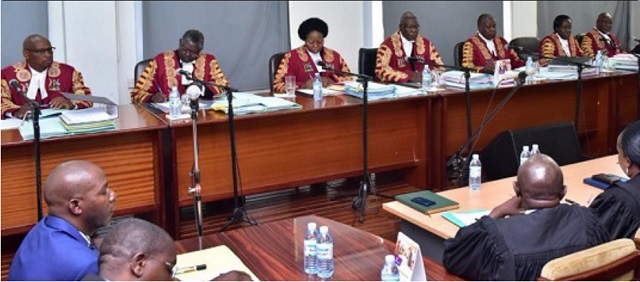
Kyagulanyi reacts
Kyagulanyi has since threatened to withdraw his petition from the Supreme Court. Kyagulanyi said the Supreme Court has shown “an unprecedented level of bias against him.” He highlighted several cases to show what he called the bias of the Supreme Court against him.
He said some of the nine justices including the Chief Justice Alfonse Owinyi-Dollo, Ezekiel Muhanguzi and Mike Chibita cannot be independent jurors because they have in the past worked closely with President Museveni who is the first respondent to the petition.
Owiny-Dollo was yet to respond to Male Mabirizi’s application, at least publicly, by the time The Independent went to press but, Oscar Kihiika, the head of legal services of the National Resistance Movement (NRM), responded almost immediately to Male Mabirizi’s petition and the alleged meeting between President Yoweri Museveni and the Chief Justice.
Kihiika noted that Owiny-Dollo’s meeting with Museveni was a follow-up to the presidential promises made on the day Museveni met the judicial officers. Kihiika said there is no way such a meeting can be connected to the election petition.
He said having a petition in the courts of law could not stop the head of the judiciary which is an arm of government from meeting the head of state since matters have to continue irrespective of any court case.
Kihiika also noted that Mabirizi is not one of the parties, neither is he the petitioner nor the respondent, and that his petition does not follow the procedures that are set out for an application of such nature.
“There are specific rules relating to the recusal of judges and magistrates from any case and this is always done formally,” Kihiika stated.
Mabirizi’s petition has merit
But, Dr. Livingstone Sewanyana, the executive director of the Foundation for Human Rights Initiative (FHRI) told The Independent on Feb.18 that Mabirizi’s petition has merit. “When it comes to asking a judge to recuse, any person has a right to petition the court,” he said, “Anyone is free to make a case.”
“The parties involved might be the priority but any person who feels that justice will be subverted can petition the same court so it can determine the merits of the matter.”
Sewanyana, however, noted that the only “unfortunate thing” is that it is the same court and in this case, Chief Justice Owiny-Dollo, who will hear Male Mabirizi’s petition.
Sewanyana added: “There have been cases where judges actually excuse themselves from hearing a case but whether Chief Justice Owiny-Dollo, will recuse is a different matter.”
Senior Counsel, Dan Wandera Ogalo who has been involved in high-stakes petitions before told The Independent on Feb.19 that recusal is determined on a case by case basis. It is also a matter of conscience of the judges, he said. He added that taking the decision to recuse is really a personal choice.
“It is always upon the judge to take the decision of whether to recuse or not,” he said. “It is about what the judge feels. If he or she feels that what the petitioner is raising is nonsense then, they will not consider the matter.”
Ogalo shared with The Independent several cases where judges were confronted with the issue. “Sometimes, a party may be raising the issue of bias when there is actually none,” Ogalo said.
In 2018, Male Mabirizi, again, petitioned the Constitutional Court to remove Justice Elizabeth Musoke from hearing the Age-Limit case, accusing the justice of having had a son with Mwesigwa Rukutana, the former Deputy Attorney General.
However, although Mabirizi was advised to file the application in Mbale, he did not. Apparently, it was not true that Rukutana and Elizabeth Musoke had a son.
Ogalo recalls another instance during the hearing of the so-called rebel MPs’ case in the Constitutional Court. Two judges were deemed potentially biased considering the fact that they had helped birth the 1995 Constitution. In a case where the NRM party was facing off with the rebel MPs, Ogalo’s clients feared the two judges would naturally protect “their baby.”
Ogalo says the judges refused to recuse themselves from the petition because they had taken an oath and they were bound by that oath to deliver justice.
 The Independent Uganda: You get the Truth we Pay the Price
The Independent Uganda: You get the Truth we Pay the Price





